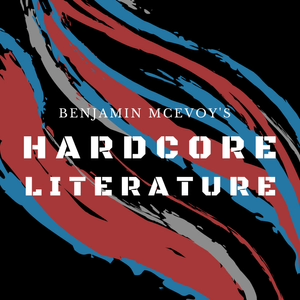
E22: The City in the Sea - Edgar Allan Poe
11/20/22 • 3 min
Edgar Allan Poe - The City in the Sea
Published: 1831
Theme:
The poem takes the reader through Death’s city. He rules this place from a throne and towers over it “gigantically”. The city is lit by nothing but the light from the sea. By following its progression a reader can see the towers, palaces, friezes, and spires that fill the city-scape. Towards the end of the poem, a change comes over the usually very still ocean. It starts to move, as does the city itself. The city sinks, slowly, down into the water, consumed by its shiny surface. This dark place is compared to a more terrible version of hell in the last lines. A place that hell would worship. (PoemAnalysis.com (2022)
Poem:
Lo! Death has reared himself a throne In a strange city lying alone Far down within the dim West, Where the good and the bad and the worst and the best Have gone to their eternal rest. There shrines and palaces and towers (Time-eaten towers that tremble not!) Resemble nothing that is ours. Around, by lifting winds forgot, Resignedly beneath the sky The melancholy waters lie. No rays from the holy heaven come down On the long night-time of that town; But light from out the lurid sea Streams up the turrets silently- Gleams up the pinnacles far and free- Up domes- up spires- up kingly halls- Up fanes- up Babylon-like walls- Up shadowy long-forgotten bowers Of sculptured ivy and stone flowers- Up many and many a marvellous shrine Whose wreathed PoemAnalysis.com (2022)
Edgar Allan Poe - The City in the Sea
Published: 1831
Theme:
The poem takes the reader through Death’s city. He rules this place from a throne and towers over it “gigantically”. The city is lit by nothing but the light from the sea. By following its progression a reader can see the towers, palaces, friezes, and spires that fill the city-scape. Towards the end of the poem, a change comes over the usually very still ocean. It starts to move, as does the city itself. The city sinks, slowly, down into the water, consumed by its shiny surface. This dark place is compared to a more terrible version of hell in the last lines. A place that hell would worship. (PoemAnalysis.com (2022)
Poem:
Lo! Death has reared himself a throne In a strange city lying alone Far down within the dim West, Where the good and the bad and the worst and the best Have gone to their eternal rest. There shrines and palaces and towers (Time-eaten towers that tremble not!) Resemble nothing that is ours. Around, by lifting winds forgot, Resignedly beneath the sky The melancholy waters lie. No rays from the holy heaven come down On the long night-time of that town; But light from out the lurid sea Streams up the turrets silently- Gleams up the pinnacles far and free- Up domes- up spires- up kingly halls- Up fanes- up Babylon-like walls- Up shadowy long-forgotten bowers Of sculptured ivy and stone flowers- Up many and many a marvellous shrine Whose wreathed PoemAnalysis.com (2022)
Previous Episode

E21: All Is Vanity, Saith the Preacher - Lord Byron
Lord Byron - All Is Vanity, Saith the Preacher
Written/Published in: Hebrew Melodies nr. 21 1815
Theme: Lord Byron’s poem is inspired by the Book of Qohelet. He transfers Qohelet’s feeling of life into a psalm, thereby condensing the Biblical material in his own way. He makes Qohelet, whom he conventionally identifies with King Solomon, look back at the happy times in his life. He interprets the Preacher’s resignation and depression by introducing the serpent from Genesis 3; this aspect helps to generalize Qohelet‘s pessimistic outlook on human life. Zsengellér, J. 2022. Understanding Texts in Early Judaism: Studies on Biblical, Qumranic, Deuterocanonical and Cognate Literature in Memory of Géza Xeravits. Berlin, Boston: De Gruyter. https://doi.org/10.1515/9783110768534
Poem:
I.Fame, wisdom, love, and power were mine,And health and youth possess'd me;My goblets blush'd from every vine,And lovely forms caress'd me;I sunn'd my heart in beauty's eyes,And felt my soul grow tender:All earth can give, or mortal prize,Was mine of regal splendour.II.I strive to number o'er what daysRemembrance can discover,Which all that life or earth displaysWould lure me to live over.There rose no day, there roll'd no hourOf pleasure unembitter'd;And not a trapping deck'd my powerThat gall'd not while it glitter'd.III.The serpent of the field, by artAnd spells, is won from harming;But that which coils around the heart,Oh! who hath pwer of charming?It will not list to wisdom's lore,Nor music's voice can lure it;But there it stings for evermoreThe soul that must endure it.
Credits: Lord Byron 1815, József Zsengellér 2022
Next Episode

E23: Lines For Winter - Mark Strand
Mark Strand - Lines For Winter
Written/Published: 1979, Selected Poems
Theme: "The echo of “as it gets cold” implies the language could be seen as appealing to readers for separate stages of understanding, not just the physical “cold” of winter, but also the coldness that comes with loss of emotion and possibly death, or at least accompanying the sober recognition of one’s own mortality. Surely, images of winter or night frequently signal acknowledgement of one’s mortality and the “gray” in line two hints at a common sign of ageing. Even the poem’s title, “Lines of Winter,” may be seen as reference to later life’s facial lines, those wrinkles gained through age and experience, particularly for anyone who has endured a history of painful events." (Edward Byrne, 2008)
Poem:
Tell yourselfas it gets cold and gray falls from the airthat you will go onwalking, hearingthe same tune no matter whereyou find yourself—inside the dome of darkor under the cracking whiteof the moon's gaze in a valley of snow.Tonight as it gets coldtell yourselfwhat you know which is nothingbut the tune your bones playas you keep going. And you will be ablefor once to lie down under the small fireof winter stars.And if it happens that you cannotgo on or turn backand you find yourselfwhere you will be at the end,tell yourselfin that final flowing of cold through your limbsthat you love what you are. Credits: Mark Strand Selected Poems 1979 / Edward Byrne 2008If you like this episode you’ll love
Episode Comments
Generate a badge
Get a badge for your website that links back to this episode
<a href="https://goodpods.com/podcasts/the-diary-of-a-nobody-662083/e22-the-city-in-the-sea-edgar-allan-poe-87172057"> <img src="https://storage.googleapis.com/goodpods-images-bucket/badges/generic-badge-1.svg" alt="listen to e22: the city in the sea - edgar allan poe on goodpods" style="width: 225px" /> </a>
Copy




